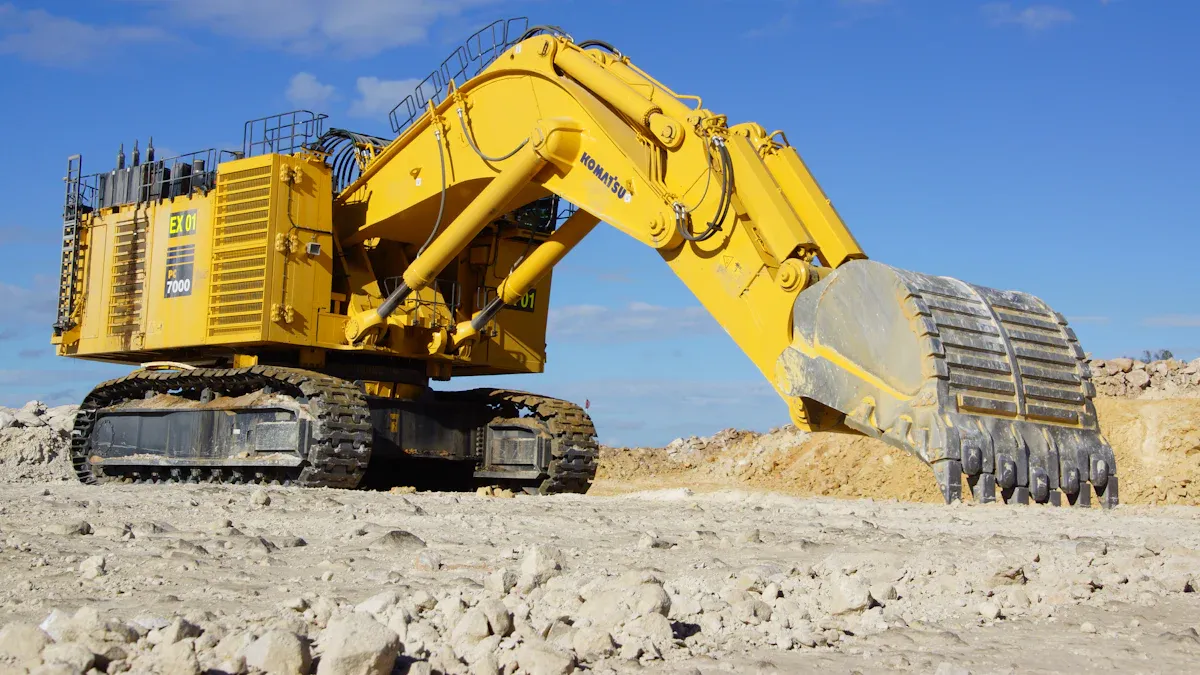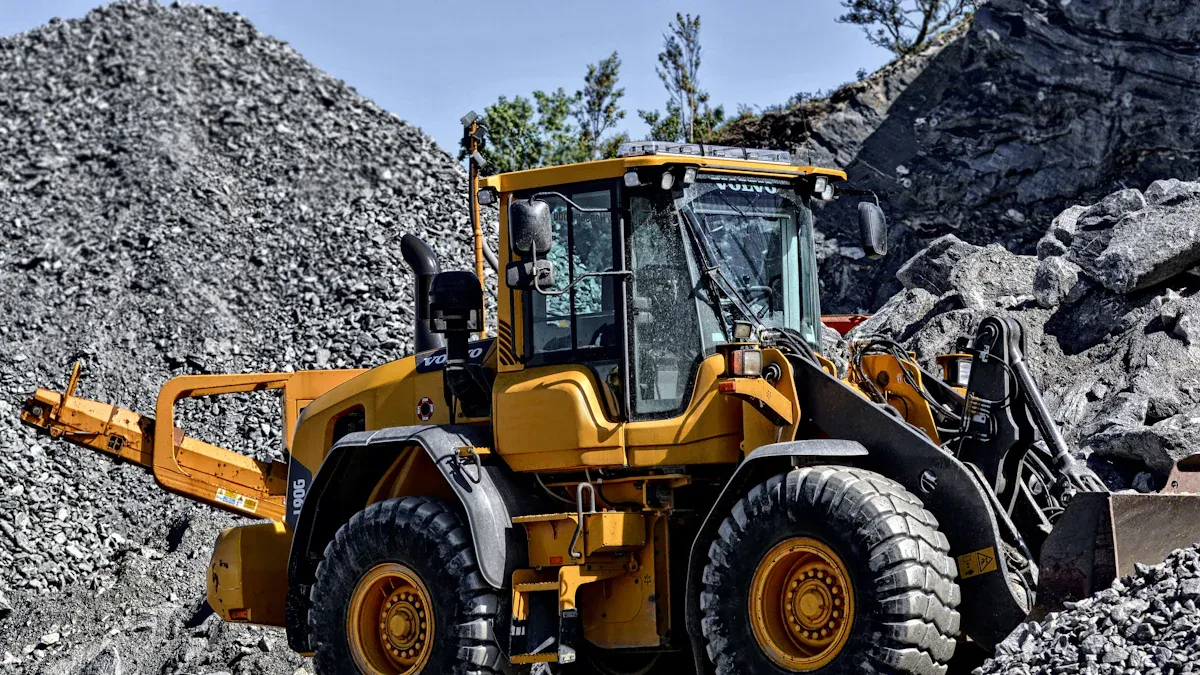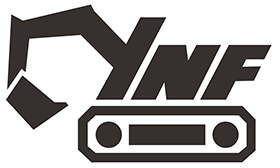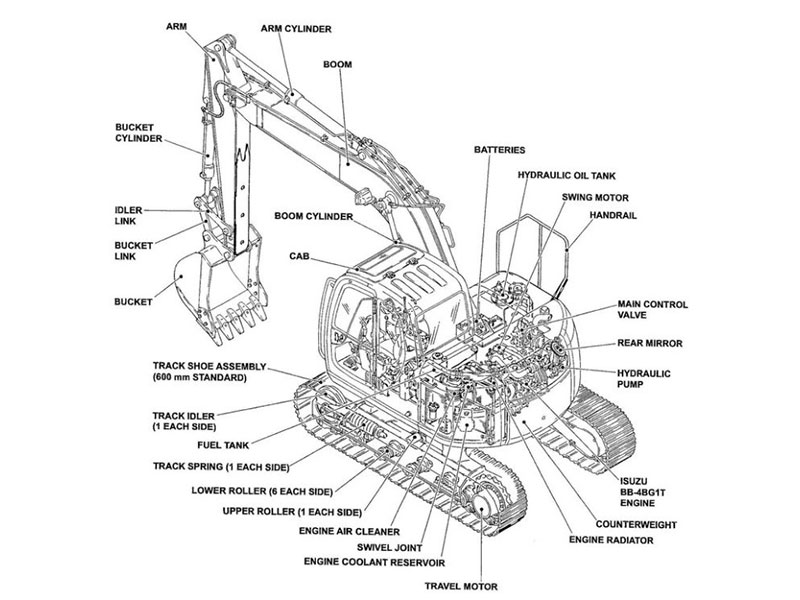Excavator Bearings
Why Choose Excavator Bearings from YNF Machinery
Discover why YNF Machinery is the trusted source for excavator bearings. High-quality slewing, swing, and thrust bearings at competitive prices with global delivery.
Step-by-Step Guide to Choose the Right Excavator Bearings
To pick the right bearings for your excavator, you should think about what your machine needs. You also need to know the bearing type. Think about how you use your equipment. You should also plan how you will take care of it. The right bearing helps your excavator work well and last longer. YNF Machinery gives you good excavator bearings. This makes it easy and safe to get what you need.
If you pick the wrong bearing, you may have more repairs. This can cost more money and stop your machine from working.
- Picking the right bearing helps your machine carry loads better and last longer.
- Studies show that using the right bearing for your job means less downtime and lower repair costs.
Use this guide to help you avoid mistakes. It will help your excavator work well.
Key Takeaways
- Picking the right excavator bearings helps the machine work better and last longer.
- Think about load capacity, speed, temperature, sealing, and lubrication when you choose bearings.
- Doing regular maintenance like greasing and checking helps stop bearing problems and expensive fixes.
- Always use the manufacturer’s advice to make sure parts fit and work well.
- YNF Machinery gives expert help and has many bearings for your excavator.
Excavator Bearing Locations

Main Points
Excavators have bearings in many places. Each spot helps the machine work well. Here are the main places where bearings are found:
- Swing Bearing (Slew Ring): This big bearing is between the top and bottom parts. It lets the top part turn easily.
- Final Drive Bearings: These bearings are inside the gears. They help the excavator move forward and backward.
- Travel Motor Bearings: These bearings are in the final drive. They help the excavator move around the work area.
- Hydraulic Pump Bearings: These bearings keep the hydraulic system working. They help the arm and bucket move as needed.
- Slew Ring Bearings: These bearings let the machine turn all the way around. This is important for digging and loading.
YNF Machinery gives you strong bearings for all these spots. You can get parts for many excavator brands. This helps you keep your machine working well.
Functions
Each bearing spot has its own job. The swing bearing lets the top part turn all the way around. This helps you put the boom and bucket where you want. The swing bearing also holds heavy loads. It keeps the machine steady when digging.
Final drive bearings and travel motor bearings help the excavator move. They make sure the gears and motors work well. This helps your machine go over rough ground without trouble.
Hydraulic pump bearings keep the hydraulic system working right. These bearings help the pump give power to the arm and bucket. This lets you lift, dig, and move things easily.
Picking the right excavator bearings for each spot makes your machine work better and safer. YNF Machinery knows how to give you good bearings that fit and last a long time.
Selection Criteria for Excavator Bearings
When you pick excavator bearings, you must look at a few things. These important points help your machine work well and last longer. Let’s look at the main things you should think about when picking bearings.
Load Capacity
First, check how much weight the bearing can hold. Excavators lift heavy things every day. You need bearings that can take this weight and force. If you choose the right load capacity, your machine will be safer and last longer. YNF Machinery checks every bearing to make sure it is strong enough.
Speed
Speed is also very important. How fast your excavator works changes what bearing you need. High speed makes strong forces inside the bearing. These forces move the load around inside. Fast parts get hot, so you need good grease. Look for bearings made for high speed and special jobs.
- High speed makes bearings hotter and adds stress.
- Good grease keeps bearings cool.
- Balanced bearings shake less.
Temperature
Temperature is another thing to think about. Excavators work in hot and cold places. You need bearings that can handle these changes. The table below shows the usual temperature ranges for different bearings:
| Bearing Type | Acceptable Temperature Range |
|---|---|
| Standard Bearings | Usually 160°F or less |
| All-metal Bearings | Up to 250°F |
| Steel Bearings with Plastic | Lower than all-metal bearings |
| High-speed Applications | 180°F to 200°F is okay |
Sealing and Lubrication
Sealing and grease are important for tough jobs. Good seals keep out dirt and water. The right grease stops rust and wear.
- Use grease that fights water and rust.
- Pick grease that works in hot and cold.
- Use strong grease for hard jobs.
Material and Durability
Material and how long it lasts are important too. You need strong materials for tough work. All-metal bearings are good for high heat. Strong materials help your machine run longer and need less fixing.
Fit and Maintenance
Fit and easy care are the last things to check. Bearings must fit your machine just right. Easy care means your machine stops less. YNF Machinery helps you pick the right fit and gives you clear help for your needs.
Tip: Always check these things for your job before you buy. YNF Machinery checks every bearing to make sure it is good.
Choosing the Right Bearing: Step-by-Step
Picking the right bearing for your excavator is a process. You need to look at your machine, your job site, and the work you do. Follow these steps to make sure you get the right bearing every time.
Assess Machine Needs
First, find out what your excavator needs. Every model is different. Check the swing bearing play to see if it is safe. Here is how you can do it:
- Put weight on the slewing ring to check swing bearing play.
- Use a dial gauge on the slewing ring.
- Take off the weight after you measure.
- Measure the play with and without the load.
- See if the play is within the safe limit.
- If you are unsure, ask an inspector for help.
This helps you know if you need a new bearing or if the old one is still good.
Match Bearing Types
You need to pick the right bearing type for your excavator’s job. Different bearings are best for different loads and movements. Tapered roller bearings handle both radial and axial loads. These are good for wheel assemblies. Cylindrical roller bearings are best for high radial loads, like in gearboxes. Needle roller bearings fit in small spaces but can carry heavy loads.
| Bearing Type | Function | Uses in Excavators and Heavy Machinery |
|---|---|---|
| Tapered Roller Bearings | Handle both radial and axial loads, reducing friction. | Common in wheel assemblies, supporting heavy loads and keeping things straight. |
| Slew Bearings | Let machines turn all the way around. | Needed for full rotation in cranes and excavators. |
| Needle Bearings | Carry heavy loads in a small size. | Used in small machines like skid steers. |
| Joint Bearings | Allow movement in many directions. | Used in machines that need to bend, like articulated dump trucks. |
Always choose the bearing that fits your machine and your work.
Evaluate Conditions
Think about where your excavator works. You need to consider temperature, moisture, and dirt. These things can change how long your bearing lasts.
- Hot or cold weather can affect the bearing.
- Water and humidity can cause rust or damage.
- Dust and dirt can get inside and wear out the bearing.
- Hard jobs with shocks and shaking can also hurt the bearing.
Check if the bearing can handle the load and if it is easy to keep greased. Good grease and regular care help your bearing last longer.
Manufacturer Recommendations
Always listen to the excavator maker’s advice. They know what is best for your machine. Here are some tips to remember:
- Pick a bearing with a load rating higher than your machine’s biggest load.
- Choose strong bearings made from tough materials like alloy steel.
- Make sure the bearing has good seals and enough grease.
- Think about your job site and the work you do.
- Ask an expert if you are not sure.
- Make sure you can get spare parts when needed.
- Check how long it takes to get the bearing.
- Make sure you have the right tools and steps for putting in and caring for the bearing.
These steps help you pick the right bearing and keep your excavator working well.
Supplier Support
You need a supplier who knows about excavator bearings and can help you. YNF Machinery is a great choice for all your bearing needs. You get expert advice, many types of bearings, and help for your machine. YNF Machinery makes picking a bearing easy and quick. You also get help with papers and shipping, so you can focus on your work.
| Aspect | Description |
|---|---|
| Expertise | YNF Machinery knows a lot about different bearings for excavators. |
| Compatibility | Their bearings fit many kinds of excavator models. |
| Personalized Assistance | They give special help based on what each excavator owner needs. |
Tip: When picking a bearing, always trust YNF Machinery for expert help and good products. This helps you get the right bearing for your machine and your job.
Common Types of Excavator Bearings

Excavator bearings come in different types. Each type helps your machine work better. You should learn about these types before you choose. YNF Machinery has many choices for your needs.
Ball Bearings
Ball bearings help your excavator move easily. They are found where turning is needed, like the cab or upper part. The table below shows their main uses and features:
| Feature/Application | Description |
|---|---|
| High Load Capacity | Holds heavy loads and gives strong support. |
| Smooth Rotational Movement | Lets parts turn smoothly for careful work. |
| Durability and Longevity | Works well in hard jobs, so your excavator keeps going. |
| Compact Design and Space-Saving | Fits in small spaces and helps the machine work better. |
| Low Friction | Cuts down on wear, so you fix things less often. |
| Easy Maintenance | Simple to care for, so you have less downtime. |
| Applications in Excavators | Used for cab rotation, boom swing, attachments, and upper part turning. |
Roller Bearings
Roller bearings give strong support for big jobs. You use them when you need to carry lots of weight. Here are some important facts:
- Roller bearings hold more weight than most other types.
- They work well in building machines because they handle big loads.
- These bearings keep working even when it gets hot or the load changes fast.
- You can trust them for hard jobs that need extra strength.
Spherical Bearings
Spherical bearings help your excavator with heavy loads and bending. You find them in joints and pivots that move in many ways. Here is what makes them special:
- Spherical bearings work well in building and mining machines.
- They hold heavy loads in parts like moving joints.
- These bearings fight bending, so they keep working if the shaft bends.
- They can take shocks and keep your machine steady.
Needle Bearings
Needle bearings are small but very strong. You use them in tight spots where you still need to carry heavy loads. The table below shows when to use them and what to watch for:
| Scenario | Advantages | Limitations |
|---|---|---|
| Mining Equipment | Handles heavy loads and tough work, keeps things running. | Can wear out if not lined up right. |
| Construction Machinery | Cuts down on wear, helps parts last longer. | Not good for big side-to-side loads. |
Tip: YNF Machinery has many kinds of excavator bearings. You can find the right one for any job or machine.
Failure Cases and Lessons
Typical Failures
Excavator bearings can have many problems. These problems can stop your machine and cost you money. Here are some common failures:
- Not enough grease makes parts rub and wear out fast.
- If parts are not lined up, they get extra stress.
- Rust can make small holes and hurt the bearing in tough places.
- Heavy loads can leave marks that never go away.
- Stray electricity can hurt the bearing and make pits.
- If you put in the bearing wrong, it can get stressed.
If you see these problems, fix them fast to stop bigger damage.
Causes and Prevention
Most failures happen because of bad care or wrong use. You can stop most problems by doing these things:
- Check your machine often to find small problems early.
- Teach workers to use machines the right way.
- Look at and clean bearings a lot to stop rust.
- Add grease to moving parts to stop metal from getting tired.
- Change filters and check fluids every day.
- Use the right tools when you put in new bearings.
- Keep everything clean when you change bearings.
Always buy from a trusted place like YNF Machinery. Their good quality helps you avoid many problems.
Tip: Keep bearings safe before you use them. Clean parts when you put them in so dirt stays out and bearings last longer.
Real-World Examples
A cement company fixed lining problems and saved $54,000 each year. This shows that picking and caring for bearings is important. Studies say checking bearing loads in excavators helps you pick the right one for hard jobs. In big machines, not enough grease makes them get too hot and wear out. Too much weight can break bearings, especially tapered roller bearings. These stories show that good care and the right bearing keep your excavator working well.
YNF Machinery gives you good help and strong excavator bearings. Their knowledge helps you avoid mistakes and keeps your machine running.
Checklist to Select the Right Bearing
Pre-Selection
You need a good plan before picking a bearing. First, look at the main points in the table. This helps you avoid mistakes and get the right part every time.
| Examination Item | Major Points to Confirm |
|---|---|
| Bearing type | What size and direction of load do you need? Will it fit in the space you have? |
| Bearing arrangement | Are you using more than one bearing on a shaft? |
| Bearing dimensions and service life | Do the size and life match what you need? |
| Bearing limiting speed, running accuracy, fits and internal clearance | Does it have the right accuracy and strength for your machine? |
| Bearing preload and rigidity | Does it have enough strength for your machine? |
| Bearing lubrication | Can the bearing keep turning well for a long time? |
| Components around the bearing | What kind of structure do you want around the bearing? |
| Bearing mounting and dismounting | Will it make fixing and checking the machine easier? |
Tip: YNF Machinery’s easy-to-use website helps you compare choices and order fast. You get help with shipping, so your parts come on time.
Installation and Maintenance
After you pick the bearing, you must put it in and care for it right. Follow these steps to keep your excavator working well:
- Put the bearing in the right way. This stops it from getting crooked or wearing out too soon.
- Add grease often. Good grease cuts down rubbing and helps the bearing last.
- Check bearings every 2,000 to 5,000 hours. Look for damage or wear.
- Change bearings if you see cracks, noise, or rough movement.
- Clean the area before you put in the bearing. Dirt can cause trouble.
- Use the right tools to put in and take out bearings. This keeps your bearing and machine safe.
Note: YNF Machinery gives you clear guides and quick shipping. You get the right part and help for every step.
Picking the right bearing for your excavator takes careful steps. You need to look at the bearing type, size, and how it fits. The checklist helps you make good choices. If you are not sure, you can ask YNF Machinery for help. Doing regular care makes your excavator bearings last longer.
Tip: Check, grease, and change parts on time. This stops problems and keeps your machine safe.
FAQ
What signs show that my excavator bearing needs replacement?
You may hear grinding noises or feel extra vibration. You might see oil leaks or notice rough movement. If you spot these signs, check your bearing soon.
How often should I grease excavator bearings?
You should grease most excavator bearings every 2,000 to 5,000 hours. Always check your machine’s manual for the best schedule. Regular greasing helps your bearings last longer.
Can I use any bearing for my excavator?
No. You must use the correct type and size for your machine. The wrong bearing can cause damage. YNF Machinery helps you find the right bearing for your excavator.
Why do bearings fail in excavators?
Bearings fail from lack of grease, dirt, heavy loads, or wrong installation. Regular checks and good care prevent most failures. Always use quality parts from YNF Machinery.
Where can I buy high-quality excavator bearings?
You can buy high-quality excavator bearings from YNF Machinery. They offer many types, expert advice, and fast shipping. Visit their website or contact their team for help.



